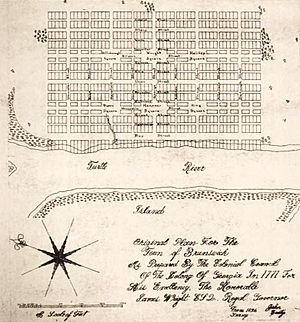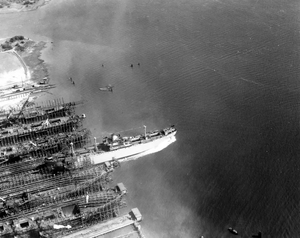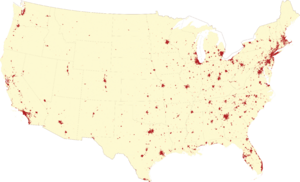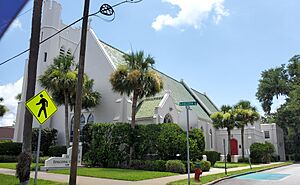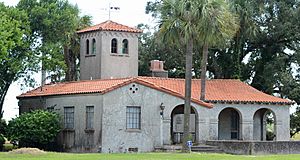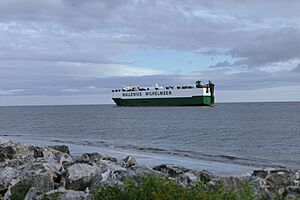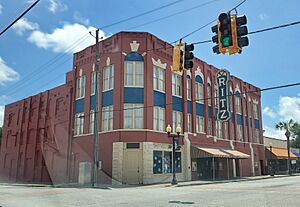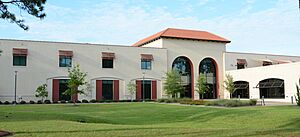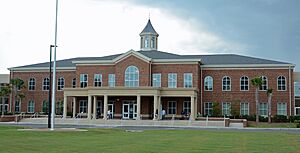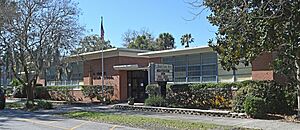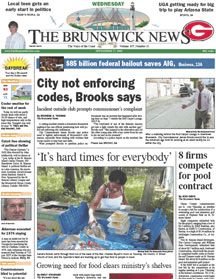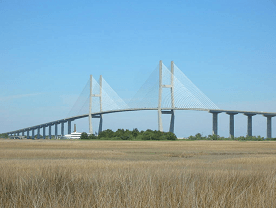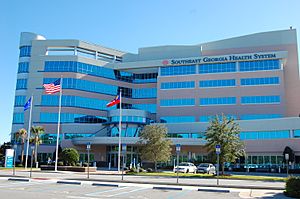Brunswick, Georgia facts for kids
Quick facts for kids
Brunswick, Georgia
|
|||
|---|---|---|---|
|
City
|
|||
|
From top, left to right: Sidney Lanier Bridge, Old Brunswick City Hall, College of Coastal Georgia, Ritz Theatre, Glynn Academy, St. Athanasius Episcopal Church, Downtown
|
|||
|
|||
| Nicknames:
"Port City"
"Shrimp Capital of the World" |
|||
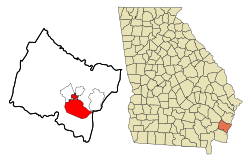
Location in Glynn County and the state of Georgia
|
|||
| Country | United States | ||
| State | Georgia | ||
| County | Glynn | ||
| Settled | 1738 | ||
| Founded | 1771 | ||
| Incorporated | 1856 | ||
| Government | |||
| • Type | Council-Manager | ||
| Area | |||
| • City | 25.09 sq mi (64.99 km2) | ||
| • Land | 17.02 sq mi (44.08 km2) | ||
| • Water | 8.07 sq mi (20.91 km2) | ||
| • Metro | 1,286 sq mi (3,332 km2) | ||
| • CCD | 42.4 sq mi (109.8 km2) | ||
| Elevation | 14 ft (4 m) | ||
| Population
(2020)
|
|||
| • City | 15,210 | ||
| • Density | 893.71/sq mi (345.06/km2) | ||
| • Metro | 112,370 | ||
| • Metro density | 87/sq mi (33.7/km2) | ||
| • CCD | 33,555 | ||
| • CCD density | 1,037/sq mi (400.3/km2) | ||
| Demonym(s) | Brunswickian | ||
| Time zone | UTC−5 (EST) | ||
| • Summer (DST) | UTC−4 (EDT) | ||
| ZIP codes |
31520-31525, 31527, 31561
|
||
| Area code(s) | 912 | ||
| FIPS code | 13-11560 | ||
| GNIS feature ID | 0354878 | ||
Brunswick is a city in Glynn County, Georgia. It is a major city in the southeastern part of Georgia. Brunswick is the second-largest city on Georgia's coast, after Savannah. In 2020, about 15,210 people lived in the city. The larger Brunswick area had about 113,495 people.
The city was named "Brunswick" after a German duchy. This duchy was the home of the House of Hanover, a royal family. Brunswick became an official city in 1856. It has always been an important port city. During World War II, it was a key military spot. It had a base for blimps and a place to build ships.
Today, Brunswick has a strong economy. It relies a lot on tourism and shipping. The Port of Brunswick is one of Georgia's two main seaports. It handles a lot of "roll-on/roll-off" trade. This means it moves vehicles like cars and trucks. The Federal Law Enforcement Training Center is also nearby. It is a big training center for law enforcement.
Brunswick sits on a harbor of the Atlantic Ocean. It is about 40 miles north of Florida. It is also about 80 miles south of South Carolina. The city is surrounded by rivers and bays. It is also close to the Golden Isles, which are barrier islands.
History of Brunswick
Long ago, the Mocama people lived in the Brunswick area. They were a Native American group. The Spanish later set up missions here in 1568. Many Native Americans were affected by disease and slavery during this time.
In 1663, the British claimed this land. But not many British settlers moved south of the Altamaha River. This was because Spain also claimed the land. In 1733, the Province of Georgia was started. In 1736, James Oglethorpe built Fort Frederica nearby. This challenged Spain's claim to the area. The British won battles in 1742, pushing the Spanish out. In 1763, a treaty officially gave the land to Georgia.
The first European settler, Mark Carr, arrived in 1738. He was a Scottish captain. He started a tobacco farm called "Plug Point." In 1771, Georgia bought Carr's land. They planned the town of Brunswick with a grid layout. This was similar to Savannah's plan. The town was named after a German duchy. The first land lot was given out in 1772.
During the American Revolutionary War, many people left Brunswick. They were loyal to Britain. After the war, some families returned. In 1788, Glynn Academy was started. Its funding came from selling town lots. Brunswick became an official port in 1789. In 1797, Brunswick became the county seat of Glynn County.
In the early 1800s, Brunswick grew. A school building was built in 1819. A courthouse and jail were also built. The town officially became a city on February 22, 1856. In 1858, Carey Wentworth Styles became mayor. He later founded The Atlanta Journal-Constitution newspaper.
By 1860, Brunswick had 468 people. It had a bank, a newspaper, and a sawmill.
Brunswick was empty during the American Civil War. Citizens were told to leave. After the war, the city faced tough times. But then, a large lumber mill opened nearby. This brought back economic growth. Railroads were built, leading to a sawmill boom. Brunswick saw an economic boom during the Reconstruction Era.
In 1878, poet Sidney Lanier wrote "The Marshes of Glynn." He was inspired by the salt marshes in the area. In the late 1800s, Brunswick became a popular winter resort. Wealthy families visited nearby Jekyll Island.
The city faced challenges in the 1890s. A yellow fever outbreak occurred in 1893. Also in 1893, a strong hurricane flooded the city. It left Brunswick under 6 feet of water. Another hurricane in 1898 caused a 16-foot storm surge. This storm sadly killed 179 people.
An electric streetcar line was built in 1911. In 1924, the F.J. Torras Causeway opened. This road connected Brunswick to St. Simons Island. The streetcar line closed in 1926 as cars became more popular.
During World War II, Brunswick was very important. German submarines threatened the coast. Blimps from Naval Air Station Glynco patrolled the area. This base was the largest blimp base in the world. These blimps helped protect almost 100,000 ships.
Brunswick also built many ships during the war. Over 16,000 workers built 99 "Liberty ships." These ships carried supplies for the war effort. The first ship was launched in 1943. The last one was launched in 1945. At its peak, Brunswick launched about four ships per month.
Geography of Brunswick
Brunswick is in southeastern Georgia. It is about halfway between Jacksonville, Florida and Savannah, Georgia. The city is located at the westernmost point of the Atlantic seaboard. It is protected by two barrier islands, Jekyll Island and St. Simons Island.
The city is on a peninsula. The East River and Turtle River are to its west. The Brunswick River is to the south. The Mackay River and the Intracoastal Waterway are to the east. Many salt marshes separate the city from the barrier islands.
Brunswick is one of the lowest places in Georgia. Its elevation is only about 10 to 14 feet above sea level. The city's land area is about 32.3 square miles. Its total area, including water, is about 42.4 square miles.
Climate in Brunswick
Brunswick has a humid subtropical climate. This means it has hot, humid summers and mild winters. In summer, temperatures often go above 90°F (32°C). The humidity makes it feel even hotter. Afternoon thunderstorms are common in summer. The hottest temperature ever recorded was 106°F (41°C) in 1986.
Winters are usually mild. The average high in January is about 63°F (17°C). The average low is about 44°F (7°C). Snow is very rare in Brunswick. The last time it snowed was in 1989. The coldest temperature ever recorded was 5°F (-15°C) in 1985 and 1966.
Brunswick gets a lot of rain, about 49.6 inches (126 cm) per year. August and September are the wettest months. This is during hurricane season. Brunswick has not been hit by a major hurricane since 1898. However, it has experienced strong winds and rain from storms passing nearby.
| Climate data for Brunswick, Georgia (1991−2020 normals, extremes 1895–present) | |||||||||||||
|---|---|---|---|---|---|---|---|---|---|---|---|---|---|
| Month | Jan | Feb | Mar | Apr | May | Jun | Jul | Aug | Sep | Oct | Nov | Dec | Year |
| Record high °F (°C) | 86 (30) |
89 (32) |
99 (37) |
99 (37) |
101 (38) |
104 (40) |
106 (41) |
103 (39) |
101 (38) |
95 (35) |
89 (32) |
87 (31) |
106 (41) |
| Mean maximum °F (°C) | 77.7 (25.4) |
80.3 (26.8) |
84.7 (29.3) |
88.7 (31.5) |
93.9 (34.4) |
97.1 (36.2) |
98.9 (37.2) |
97.6 (36.4) |
93.8 (34.3) |
88.4 (31.3) |
83.0 (28.3) |
78.6 (25.9) |
99.5 (37.5) |
| Mean daily maximum °F (°C) | 61.0 (16.1) |
64.3 (17.9) |
70.1 (21.2) |
76.3 (24.6) |
83.0 (28.3) |
87.5 (30.8) |
90.3 (32.4) |
88.8 (31.6) |
84.3 (29.1) |
77.5 (25.3) |
69.2 (20.7) |
63.3 (17.4) |
76.3 (24.6) |
| Daily mean °F (°C) | 52.5 (11.4) |
55.7 (13.2) |
61.3 (16.3) |
67.7 (19.8) |
75.0 (23.9) |
80.2 (26.8) |
82.8 (28.2) |
81.9 (27.7) |
78.2 (25.7) |
70.3 (21.3) |
61.0 (16.1) |
55.1 (12.8) |
68.5 (20.3) |
| Mean daily minimum °F (°C) | 44.0 (6.7) |
47.0 (8.3) |
52.6 (11.4) |
59.2 (15.1) |
67.1 (19.5) |
72.9 (22.7) |
75.3 (24.1) |
75.1 (23.9) |
72.0 (22.2) |
63.1 (17.3) |
52.9 (11.6) |
46.9 (8.3) |
60.7 (15.9) |
| Mean minimum °F (°C) | 27.6 (−2.4) |
30.9 (−0.6) |
36.2 (2.3) |
44.8 (7.1) |
54.6 (12.6) |
64.5 (18.1) |
69.0 (20.6) |
69.1 (20.6) |
61.8 (16.6) |
47.1 (8.4) |
35.9 (2.2) |
31.2 (−0.4) |
25.0 (−3.9) |
| Record low °F (°C) | 5 (−15) |
13 (−11) |
21 (−6) |
34 (1) |
35 (2) |
51 (11) |
58 (14) |
61 (16) |
45 (7) |
36 (2) |
21 (−6) |
11 (−12) |
5 (−15) |
| Average precipitation inches (mm) | 3.54 (90) |
3.06 (78) |
3.80 (97) |
3.07 (78) |
3.04 (77) |
6.35 (161) |
4.94 (125) |
6.95 (177) |
6.26 (159) |
4.60 (117) |
2.03 (52) |
2.65 (67) |
50.29 (1,277) |
| Average precipitation days (≥ 0.01 in) | 8.2 | 8.3 | 7.8 | 6.5 | 7.0 | 12.2 | 10.6 | 13.3 | 10.1 | 7.7 | 5.4 | 7.3 | 104.4 |
| Source: NOAA | |||||||||||||
People in Brunswick
| Historical population | |||
|---|---|---|---|
| Census | Pop. | %± | |
| 1810 | 36 | — | |
| 1860 | 825 | — | |
| 1870 | 2,348 | 184.6% | |
| 1880 | 2,891 | 23.1% | |
| 1890 | 8,459 | 192.6% | |
| 1900 | 9,081 | 7.4% | |
| 1910 | 10,182 | 12.1% | |
| 1920 | 14,413 | 41.6% | |
| 1930 | 14,022 | −2.7% | |
| 1940 | 15,035 | 7.2% | |
| 1950 | 17,954 | 19.4% | |
| 1960 | 21,703 | 20.9% | |
| 1970 | 19,585 | −9.8% | |
| 1980 | 17,605 | −10.1% | |
| 1990 | 16,433 | −6.7% | |
| 2000 | 15,600 | −5.1% | |
| 2010 | 15,383 | −1.4% | |
| 2020 | 15,210 | −1.1% | |
| U.S. Decennial Census 1850-1870 1870-1880 1890-1910 1920-1930 1940 1950 1960 1970 1980 1990 2000 2010 |
|||
In 2020, Brunswick had 15,210 people living in the city. There were 6,486 households. The average age of people in Brunswick was about 34.8 years old. About 16.7% of the population was under 9 years old. About 20.5% were between 15 and 29 years old. And 16.5% were 65 or older.
The average household income in 2020 was $27,471. For families, the average income was $29,953. Brunswick has a lower cost of living compared to larger cities like Atlanta.
Diversity in Brunswick
| Race | Num. | Perc. |
|---|---|---|
| White (non-Hispanic) | 4,622 | 30.39% |
| Black or African American (non-Hispanic) | 8,548 | 56.2% |
| Native American | 24 | 0.16% |
| Asian | 55 | 0.36% |
| Pacific Islander | 6 | 0.04% |
| Other/Mixed | 511 | 3.36% |
| Hispanic or Latino | 1,444 | 9.49% |
Brunswick has a diverse population. In 2020, about 56.2% of the people were Black or African American. About 30.39% were White (not Hispanic). Other groups included Native American, Asian, and Pacific Islander people. About 9.49% of the population was Hispanic or Latino.
Religions in Brunswick
Many people in Brunswick are Christian. The largest Christian groups are Baptists and Catholics. Methodists and Pentecostals are also common. Other Christian groups include Presbyterians, Episcopalians, and Lutherans. The Church of Jesus Christ of Latter-Day Saints also has members here.
Brunswick also has a Jewish community. The historic Temple Beth Tefilloh was founded in 1886. Some people in the area also follow Eastern religions like Buddhism or Hinduism.
Brunswick's Economy
The Port of Brunswick is very important to the city's economy. It is one of the busiest ports on the East Coast. It is the sixth-busiest port in the U.S. for cars. It helps export cars from Ford and General Motors. It also exports Mercedes-Benz cars. The port imports cars from Hyundai, Kia, Jaguar, Land Rover, Mitsubishi, Porsche, and Volvo. Audi, BMW, and Volkswagen also use the port. International Auto Processing is a big employer in the city. Besides cars, the port also handles farm products and other goods.
The port has four different areas. Mayor's Point is inside the city. The other areas are outside the city. The Georgia Ports Authority runs the port.
The Federal Law Enforcement Training Center (FLETC) is north of Brunswick. It is a large training center for law enforcement. FLETC is the biggest employer in Glynn County. It brings over $600 million to the local economy each year.
Other major employers in Brunswick include Southeast Georgia Health System. This is the largest private employer. Other companies are King & Prince Seafood, Pinova, and Gulfstream Aerospace. Georgia-Pacific has a mill that makes wood pulp. This mill is one of the largest in the world for fluff production. Gulfstream Aerospace, which makes jet aircraft, is also at the city's airport.
Tourism is the biggest industry in Brunswick and Glynn County. Brunswick and the Golden Isles are popular vacation spots all year. People from all over the world visit the islands for their beaches, resorts, shops, and historical sites. In 2004, President George W. Bush hosted the G8 summit on nearby Sea Island.
Culture in Brunswick
Arts and Theatre
Brunswick has many arts and cultural events. The Coastal Symphony of Georgia is a professional music group. They perform at Glynn Academy's Memorial Auditorium. They also have a Youth Symphony.
The historic Ritz Theatre in Old Town Brunswick hosts many shows. It was renovated in the early 2000s. The Ritz is home to the Golden Isles Arts and Humanities Association. This group helps coordinate arts events in Brunswick.
The city also has art galleries. Art Downtown is a cultural arts center. It has a fine art gallery and a studio. It is also home to the Brunswick Actors' Theatre. The Gallery on Newcastle shows scenes from coastal Georgia's marshes.
Union Street has many beautiful 19th and early 20th-century Victorian houses. Every December, the Magnolia Garden Club offers tours of these homes.
Food in Brunswick
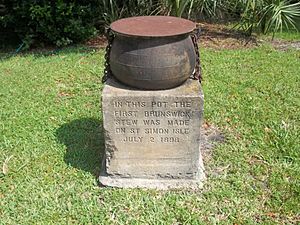
Brunswick is famous for Brunswick stew. This is a tomato-based stew. It has lima beans, corn, okra, and other vegetables. It also has meat, often chicken, pork, or beef. Some older recipes used squirrel or rabbit. A large iron pot in the city has a plaque. It says the stew was first cooked there in 1898.
Every October, Brunswick hosts the Rockin' Stewbilee. Visitors can taste over 50 different stews. The Stewbilee became famous when Brunswick invited Brunswick County, Virginia, for a stew cookoff. This led to the "Stew Wars" being featured in Southern Living.
Brunswick is also a center for Georgia's shrimping industry. The city was once called "The Shrimp Capital of the World." Nearby Jekyll Island hosts the Wild Georgia Shrimp & Grits Festival in September. The area is also known for its crab and oyster industries.
Sports in Brunswick
The College of Coastal Georgia has many sports teams. Local high schools compete in Georgia High School Association events. From 1950 to 2007, Brunswick hosted the Golden Isles Bowl Classic. This was a big junior college football game. School and community sports are played at various facilities. Glynn County Stadium and Lanier Field are two sports stadiums.
Golden Isles Speedway is a race track west of the city.
The PGA Tour holds the RSM Classic every year. It takes place at the Seaside Course on Sea Island. The area is famous for its golf resorts. Sea Island has been ranked as a top place for business meetings and golf. There are many golf courses in the Brunswick area.
Brunswick is the gateway to Jekyll and St. Simons islands. These islands are called the Golden Isles. They have white-sand beaches. They are popular for tourists and locals. You can reach them by car using causeways from Brunswick.
Brunswick has also had minor league baseball teams. The Brunswick River Snipes played in 1906. The Brunswick Pilots played in the 1910s. Later, the Brunswick Pirates played from 1951 to 1958. They won league championships in 1954 and 1955. The Brunswick Cardinals also played in the early 1960s.
Parks and Fun in Brunswick
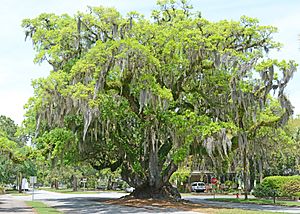
The Brunswick Parks and Recreation Department manages the city's parks and squares. Six city squares were part of Brunswick's original plan from 1771. Five of these squares still exist today. Hillsboro Square is now part of the Glynn Academy High School campus. There are also two other squares: Orange and Palmetto.
The city has many parks. The largest is Howard Coffin Park. Parks have playgrounds, baseball fields, soccer fields, and basketball courts. Coffin Park also has a walking track. The Roosevelt Lawrence Community Center offers games and classrooms.
The Brunswick area is known for its Southern live oak trees. These trees are very strong. Revolutionary warships, like the USS Constitution, were built with oak from St. Simons Island. Brunswick has a famous live oak called Lover's Oak. It is about 900 years old. Native American stories say that young couples would meet under this tree. Another famous tree is Lanier's Oak. Poet Sidney Lanier was inspired to write "The Marshes of Glynn" there.
Blythe Island Regional Park is also located within the city.
Education in Brunswick
Colleges and Universities
Brunswick is home to the College of Coastal Georgia. It has over 3,000 students. For many years, it was a two-year college. But in 2008, it began offering four-year degrees. It is now a state college. It offers bachelor's degrees in education, business, and nursing. It also has associate degree programs.
Schools for Kids
The Glynn County School District runs the public schools in Brunswick. Over 12,000 students attend these schools. There are ten elementary schools, four middle schools, and two high schools. The high schools are Brunswick High School and Glynn Academy. Glynn Academy is one of the oldest public high schools in the United States. It was founded in 1788. Brunswick High School opened in 1967. There is also a career-technical academy.
Several private schools operate in the area. In Brunswick, there is a Catholic school and a Seventh-day Adventist school. Other Christian schools are located north of the city. There is also a Presbyterian school on St. Simons Island.
Media in Brunswick
The Brunswick News is a daily newspaper in Brunswick. Another major paper is The Georgia Times-Union. The Harbor Sound is a free weekly newspaper. The Islander is another weekly paper.
Brunswick has several radio stations. Some are news and talk stations. Others play music. There are also public radio stations.
WPXC-TV, channel 21, is the only local TV station. It is an Ion affiliate. You can also watch major U.S. TV networks from stations in Jacksonville and Savannah.
Getting Around Brunswick
Brunswick Golden Isles Airport offers flights to Hartsfield–Jackson Atlanta International Airport.
Two railway lines run through the city: CSX and Norfolk Southern. The Golden Isles Terminal Railroad connects to the Port of Brunswick. Passenger train service to Brunswick ended in the 1960s. You can find Amtrak passenger service in Jesup, about 40 miles northwest.
The Sidney Lanier Bridge crosses the Brunswick River. The original bridge opened in 1956. Sadly, ships hit it twice, in 1972 and 1987. A new cable-stayed bridge with the same name opened in 2003. This new bridge is taller. It allows larger ships to enter the port. It is the longest bridge in Georgia.
Three federal highways pass through Brunswick: U.S. Route 17, U.S. Route 341, and U.S. Route 25. Interstate 95 runs west of the city.
Glynn County has been working to start a public bus service. This would help people get around the city.
Healthcare in Brunswick
Southeast Georgia Health System is the main healthcare provider in Brunswick. It is also the largest private employer. Its hospital in Brunswick has 316 beds. It provides full medical services. The hospital also helps international sailors who come to the port.
Southeast Georgia Health System also has a nursing facility. It offers short-term and long-term care. They recently opened an Outpatient Care Center. This building has surgery and imaging services. It also has a Cancer Care Center and doctor's offices.
In 2004, the Brunswick campus was named the Best Large Hospital in Georgia.
Sister Cities
Brunswick has "sister cities" in other countries. These partnerships help encourage cultural and economic exchanges.
 Ganzhou, Jiangxi, People's Republic of China
Ganzhou, Jiangxi, People's Republic of China Ilan, Yilan County, Taiwan Province, Republic of China
Ilan, Yilan County, Taiwan Province, Republic of China
Notable People from Brunswick
- Anthony Alaimo, a judge
- Spencer Atkinson, an orthodontist
- Sam Bowen, a baseball player
- Morgan Brian, a Women's World Cup soccer champion
- Kwame Brown, an NBA player
- Barret Browning, a baseball player
- Francis Buzzacott, a frontiersman and writer
- Justin Coleman, an NFL cornerback
- DeeJay Dallas, an NFL running back
- Ed Dudley, a professional golfer
- Amos Easton, also known as Bumble Bee Slim, a musician
- Steven C. Frucci, a judge
- Freeman Hankins, a state senator
- Mary Hood, a writer
- Anna Jay, a professional wrestler
- ReShard Lee, a football player
- Davis Love III, a professional golfer
- Jack McDevitt, a science-fiction writer
- Kristen Morgin, a sculptor
- Jack Peerson, a baseball player
- Harry Pickens, a jazz pianist
- Tony Pierce, a baseball player
- Darius Slay, an NFL cornerback
- Doris Buchanan Smith, an author
- Raymond M. Lloyd, a professional wrestler
- Aaron Swinson, a college basketball coach and former player
- Albert Tresvant, the first African-American mayor of Opa-locka, Florida
- Adam Wainwright, a baseball pitcher
- Tracy Walker, an NFL safety
- Ike Williams, a professional boxer
- Madaline A. Williams, the first African American woman elected to the New Jersey Legislature
Images for kids
See also
 In Spanish: Brunswick (Georgia) para niños
In Spanish: Brunswick (Georgia) para niños
 | Janet Taylor Pickett |
 | Synthia Saint James |
 | Howardena Pindell |
 | Faith Ringgold |











